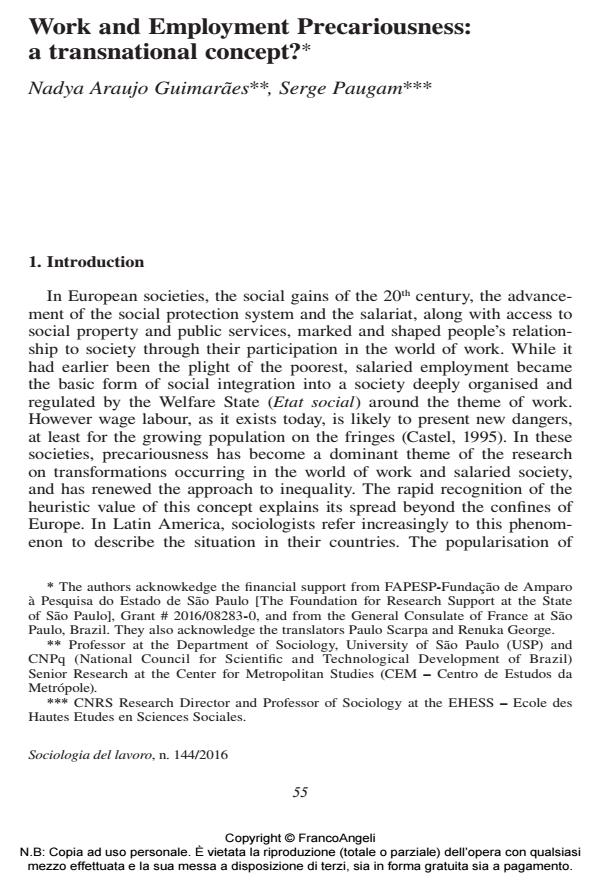Work and Employment Precariousness: a transnational concept?
Journal title SOCIOLOGIA DEL LAVORO
Author/s Guimaraes Nadya Araujo, Serge Paugam
Publishing Year 2016 Issue 2016/144
Language English Pages 30 P. 55-84 File size 176 KB
DOI 10.3280/SL2016-144005
DOI is like a bar code for intellectual property: to have more infomation
click here
Below, you can see the article first page
If you want to buy this article in PDF format, you can do it, following the instructions to buy download credits

FrancoAngeli is member of Publishers International Linking Association, Inc (PILA), a not-for-profit association which run the CrossRef service enabling links to and from online scholarly content.
In France and, more generally, in European societies, precariousness has become a dominant theme in the research on the changing world of work and salaried society. This debate renewed the approach of inequality. It refers to two dimensions: work precariousness - increased productivity, work intensification and new relations vis-a-vis the work conditions - and employment precariousness - job insecurity, labour contract flexibility and instability. The heuristic value of this concept was quickly recognized, which explains its spread beyond the borders of Europe. In Latin America, the sociologists use it increasingly to describe the situation in their countries. The generalization of this concept proves problematic, however, if we forget the historical particularities that give the precariousness its structural form and its meaning for individuals. In fact, since this concept was developed in France and Europe in reference to a labour society decaying, can we transpose it mechanically to emerging countries in which we have been observing a progressive formalization and extension of wage labour? To check if the concept of precariousness can be used at a transnational level, it is first necessary to consider the effect of economic and social policy cycles on the construction of representations of wage labour. These cycles are different in different cultural areas. But the notion of work precariousness also needs to be revisited. The new production methods seem to cause more suffering at work. Are they similar from one country to another? A comprehensive critical review is needed. In this paper we mobilize comparative data produced in Brazil as well as in France in order to confront those issues.
Keywords: Precariousness, salaried society, France, Brasil, social disqualification
- Mulheres paulistanas no Prouni: mediações entre a universidade e a precariedade Henrique Costa, in Mediações - Revista de Ciências Sociais /2019 pp.213
DOI: 10.5433/2176-6665.2019v24n3p213 - Labor Market and Labor Relations under the PT Governments Ana Paula Fregnani Colombi, José Dari Krein, in Latin American Perspectives /2020 pp.47
DOI: 10.1177/0094582X19875713 - 50 questions de sociologie Serge Paugam, Patricia Vendramin, pp.243 (ISBN:9782130820673)
Guimaraes Nadya Araujo, Serge Paugam, Work and Employment Precariousness: a transnational concept? in "SOCIOLOGIA DEL LAVORO " 144/2016, pp 55-84, DOI: 10.3280/SL2016-144005